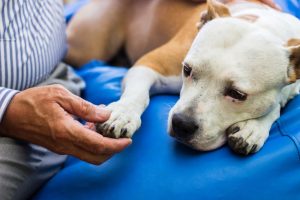How Do Dogs Age?

How do dogs age? The average life expectancy of a human has risen dramatically over the last hundred years, and so have the life expectancies of most dogs. This is largely the result of better food, vaccines and preventative care, and more effective medical treatment. However, it does mean that there are more elderly pets out there!
When does a dog become “old”?
Well, some dogs never do (in their heads at least!). It does vary quite a lot – generally, small breeds like terriers or Chihuahuas live longer (average 13 years but often into their mid or late teens); and large breeds like Great Danes are lucky to reach 8.
Of course, it’s not just breed – different individuals will age at different rates, some being quite “old” by 5 or 6, and others still sprightly at 12! As a rough rule of thumb, though, we’d say that dogs need some additional care once they’re older than either 7 years, or 60% of their expected lifespan.
And just like older humans, older dogs have specific care requirements and are more prone to certain diseases and conditions.
How do their bodies change?
The most important changes are that their bodies tend to become less efficient, and their metabolism slows down. This goes hand-in-hand with the effects of years of cumulative “wear-and-tear” changes on the cells of the body, which gradually accumulate genetic damage over the years. In fact, there is good evidence to suggest that “aging” is a genetic process – as the cells get older, the “telomeres” (a long length of DNA on the end of each chromosome) become progressively shorter, resulting in alterations to cell activity.
On the whole-dog scale, we tend to see this as:
- Middle-aged spread (not just a human problem! Older dogs tend to put on a few extra pounds as well…)
- Thinning and weakening of the skin, with a marked loss of elasticity.
- Greying of the coat (as dogs age, the numbers of pigment cells in the hair follicles decrease, and eventually they’re all used up. From then on, the hair grows out as white).
- Reduced organ efficiency – typically, weaker muscles, slightly softer bone (osteoporosis), a weaker immune system, and a predisposition to kidney, liver and heart problems.
However, remember that old age isn’t a “disease” – just a change, An old dog may be just as healthy as a young one, it just means that certain diseases are more likely, and they tend to bounce back more slowly from illness or injury.
How Do Dogs Age? Surely, there are some diseases of older dogs?
Yes, there certainly are. These tend to be either degenerative diseases, where cells have died and not been replaced, or wear-and-tear diseases, where a lifetime of damage starts to stack up. The most common are:
-
Bad Teeth- essentially, a lifetime of not brushing and flossing! We can, and should, brush our dogs’ teeth for them, to minimise this.
-
Arthritis – years of exercise result in “stiffness” of the joints, being slow to get up in the mornings, often seen as “slowing down” – or, as the dog sees it, constant pain. Remember, a “stiff” dog is probably a painful dog! There are a number of management changes we can put in place to make life easier, and there are effective medications if necessary as well – talk to one of our vets for advice.
-
Heart disease – it’s very common for an older dog to develop leaking heart valves, resulting in a heart murmur. This is not a curable condition yet, but it IS treatable – if the vet picks up a murmur at your next routine consult, there’s a lot that can be done nowadays!
-
Urinary incontinence – This is most common in older bitches, but can affect any elderly dog, as the muscles of the bladder and pelvic floor naturally weaken with age. This usually requires medication, but sometimes just letting them out to wee more often is sufficient.
-
Dementia – sadly, like people, many dogs’ brains also become less efficient with age. Most older dogs tend to struggle to cope with new situations; however, dogs with Canine Dementia (or Canine Cognitive Impairment, if you prefer), have a much more severe, Alzheimer’s-like condition. This results in unusual responses to normal events, and can lead to them getting “stuck in a loop”, doing the same things over and over again. Although incurable, there are medications which can help alleviate the symptoms.
How should I help my older dog?
Like any dog – it depends on what their needs as an individual are. In general, however, it’s important to make sure they get:
- A good-quality senior diet, that’s suited to their life-stage.
- Regular check-ups with one of our vets, to make sure we can stay on top of any medical issues.
- Plenty of mental and physical exercise – little and often is much better than wearing them out!
If you have any concerns about your dog’s health or how dogs age, make an appointment with your vet to get them checked.
Tags: Dog ageing, End Of Life Care For PetsCloud 9
To ensure accuracy, a professional vet has reviewed and verified the information presented in this article. It is important to note that when it comes to making decisions about euthanasia for your pet, there are no easy answers. It is always recommended to seek advice from your own veterinarian before making any decision.


